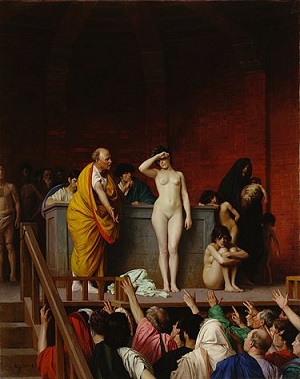
Slave Market by Jean-Léon Gérôme courtesy of wikipedia.org
I’d been a teacher in the classroom for little more than a year when I came to a crossroads, either I should strike for teacher’s rights or cross a picket line. My impulse was to ignore the strike on behalf of my students, but when a senior teacher heard my decision, he shook his head. “You’re not defending your students. You’re supporting a mediocre system that doesn’t serve them. The students are why we must strike.”
At first, I thought the argument was self-serving because salaries were part of the negotiating package. But after consideration, I, too, decided pupils benefitted when decent salaries attracted skilled professionals. Taxpayers might prefer altruistic instructors who are willing to work for a pittance, but when paychecks are meager, the job pool of applicants is meager also, particularly in the United States, where money equates with respect.
I decided to toss out Mother Teresa as a role model and joined the AFL-CIO. I wanted to stand shoulder-to-shoulder with plumbers, carpenters, and electricians who knew their worth. Regrettably, gaining a similar respect for women isn’t as easy. Patriarchal societies that dominate the planet have spun social and legal webs that deprive females of basic rights. A law like primogeniture in England is one example. Defining American women as chattel is another. A holdover from those darker times is the disregard some businesses show regarding pay equity.
Conditions in the Middle East are no better. Afghan leaders make females prisoners in their homes. NGOs argue that women have a vital role in food distribution in that country. The Taliban counters that the Muslim faith forbids their participation. Faced with Hobson’s choice, to abandon women or let the nation starve, they chose to fight hunger.
If the game were chess, defending women‘s rights would be simple. Defy the Taliban and let the nation starve. But famine isn’t a game. Like the question of whether to strike or not, the NGOs’ decision is understandable, but it creates consequences that are at cross purposes.
Religious taboos that hold women as hostages are common. No one should be surprised that when Roe V. Wade was overturned, denying women a Constitutional right to control their bodies, misogynistic faiths rushed in to fill the vacuum.
Normally, a faith’s precepts would have no hold over females outside the faith. But, when states are free to inscribe religious taboos into civil law, all females are hobbled.
The sexual bias is inescapable. No state or federal legislator has ever proposed that American males be circumcised.
Most of our citizens agree that Church and State should be separated. Otherwise, incongruities arise. Take, for example, Ohio’s new law that bans abortion after six weeks. When a 10-year-old rape victim sought the procedure, authorities denied her request because the clock had run out.
The faithful approved the decision. A fetus had a right to life, they said. But what of the child’s peril? Her odds of surviving childbirth with an immature womb were slim.
To give preference to a potential life over the life of the mother hearkens back to early Christianity. Borrowing from Aristotle, it taught that men were the life givers. Women were receptacles. As such, the latter had little to distinguish them from cattle. When they became pregnant and how often was a matter of husbandry in every sense of the word. The stigma of that disregard exists today and may explain why femicide is common.
No scientific or objective reason exists to oppose abortion. Again, the taboo is religious. The consequence of inserting the prohibtion into law is catastrophic for women. Limiting their potential to biology, as I’ve observeed, awards them the status of dairy cows. Ironically, that negativity persists even though religious practice in the U. S. is in decline.
Biblical taboos that women endure are forms of sexual apartheid. To keep one-half of the human population in bondage to another is profane. Some women bend their necks to it. No woman should. Uuru!
